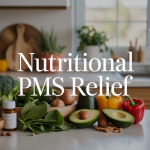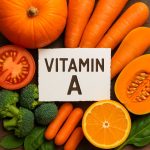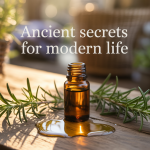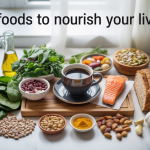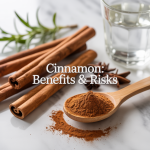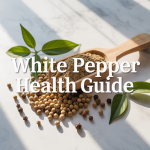The Synergistic Role of Vitamin C and B12 in Nutrition
Your body runs on countless nutrients working behind the scenes, but few partnerships are as powerful as the one between vitamin C and B12. These two essential vitamins don’t just support your health individually—they actually boost each other’s effectiveness when consumed together.
This guide is designed for health-conscious individuals, nutrition enthusiasts, and anyone looking to optimize their vitamin intake through smart dietary choices and supplementation strategies.
We’ll explore how vitamin C and B12 work together to maximize your body’s absorption and utilization of these crucial nutrients. You’ll also discover the most effective food sources and dietary approaches to ensure you’re getting optimal amounts of both vitamins. Finally, we’ll cover practical supplementation guidelines that can help you achieve enhanced wellness while avoiding common deficiency pitfalls.
Understanding Vitamin C’s Essential Functions in Your Body
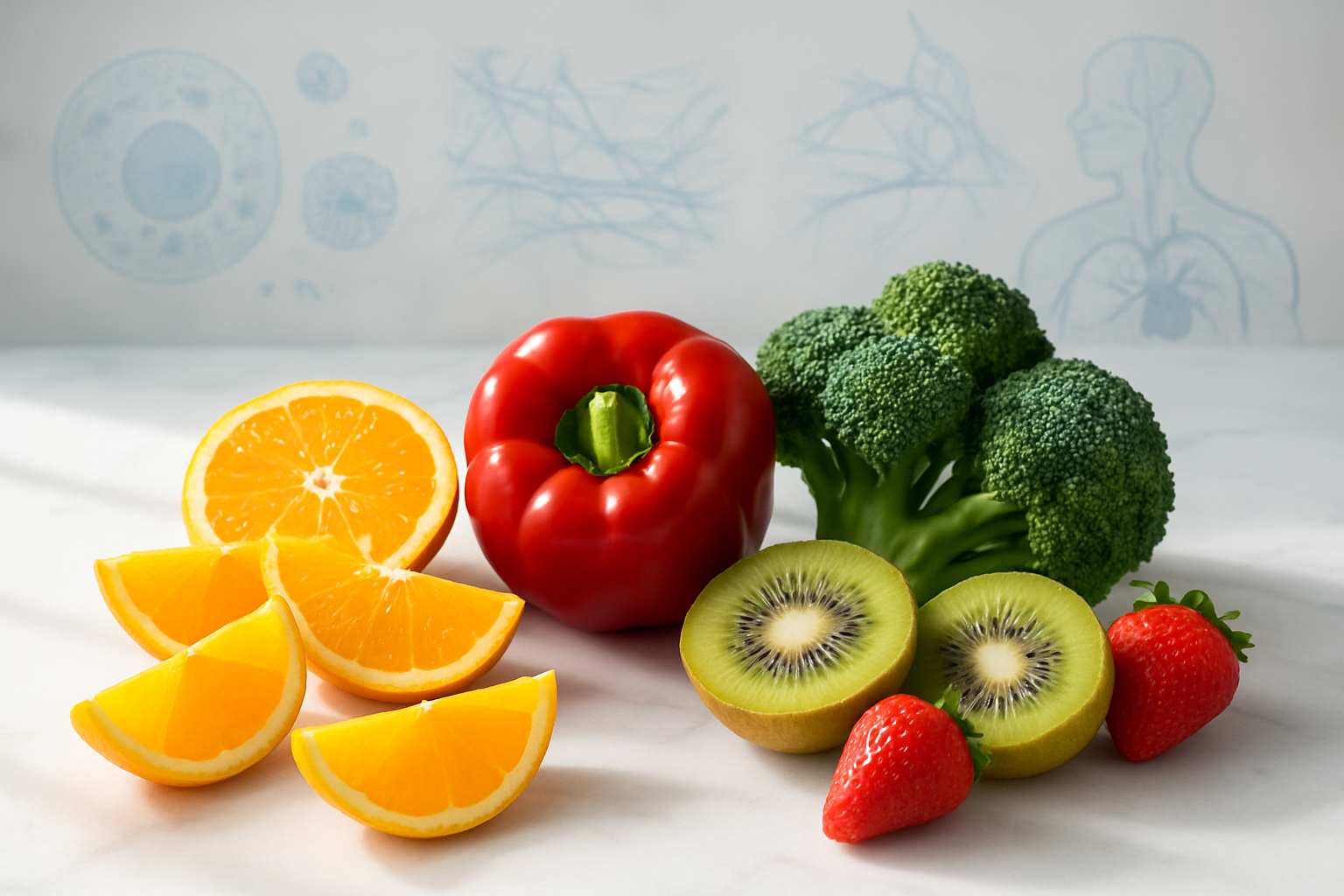
Powerful antioxidant protection against cellular damage
Vitamin C acts as your body’s frontline defense against free radicals – those unstable molecules that bounce around your cells causing havoc. These troublemakers come from everywhere: pollution, stress, UV rays, even normal metabolism. When free radicals accumulate, they damage cell membranes, proteins, and DNA, speeding up aging and increasing disease risk.
Here’s where vitamin C shines. This water-soluble vitamin donates electrons to neutralize free radicals before they can wreak havoc. What makes vitamin C special is its ability to regenerate other antioxidants like vitamin E, creating a powerful defensive network throughout your body.
Your brain, heart, and skin especially benefit from this protection. The antioxidant power helps prevent cardiovascular disease by protecting LDL cholesterol from oxidation – a key step in artery-clogging plaque formation. Research shows people with higher vitamin C levels have significantly lower rates of heart disease and stroke.
Collagen synthesis for healthy skin and connective tissues
Think of collagen as your body’s scaffolding. This protein makes up about 30% of all protein in your body, providing structure to skin, bones, tendons, blood vessels, and organs. Without adequate vitamin C, collagen production grinds to a halt.
Vitamin C serves as an essential cofactor for enzymes that build collagen chains. Specifically, it helps convert two amino acids – proline and lysine – into hydroxyproline and hydroxylysine, which stabilize the collagen structure. Without this process, collagen becomes weak and unstable.
You can see vitamin C deficiency’s impact on collagen in scurvy symptoms: bleeding gums, slow wound healing, and fragile blood vessels. Even mild deficiencies show up as premature wrinkles, joint pain, and easy bruising. Getting enough vitamin C keeps your skin elastic, wounds healing quickly, and joints moving smoothly.
Enhanced iron absorption for optimal blood health
Iron absorption can be tricky business. Your body absorbs heme iron from meat relatively easily, but non-heme iron from plants presents a challenge. This is where vitamin C becomes your iron absorption superhero.
Vitamin C converts iron from its ferric form (Fe3+) to ferrous form (Fe2+), which your intestines can actually absorb. This conversion happens right in your digestive tract, dramatically boosting iron uptake from plant-based foods. Studies show vitamin C can increase iron absorption by up to 300%.
This partnership becomes especially important for vegetarians, vegans, and people with iron deficiency anemia. Pairing vitamin C-rich foods with iron-rich meals creates an absorption powerhouse. Think spinach salad with strawberries, or lentil soup with bell peppers.
Women of childbearing age particularly benefit from this combination since they need more iron due to monthly blood loss. The vitamin C-iron duo helps maintain healthy hemoglobin levels and prevents the fatigue and weakness that comes with iron deficiency.
Immune system strengthening and infection resistance
Your immune system relies heavily on vitamin C to function at peak performance. White blood cells – your body’s infection-fighting soldiers – concentrate vitamin C at levels 40 times higher than blood plasma. This concentration isn’t accidental; these immune cells need vitamin C to work effectively.
Vitamin C enhances several immune functions. It boosts the production and activity of white blood cells, particularly neutrophils, lymphocytes, and phagocytes. These cells hunt down and destroy pathogens like bacteria and viruses. The vitamin also strengthens your skin’s barrier function, making it harder for germs to enter your body.
During infections, your vitamin C levels drop rapidly as your immune system uses it up. This is why people often crave citrus fruits when they’re sick – your body knows what it needs. While vitamin C won’t necessarily prevent every cold, adequate levels help reduce infection duration and severity.
Chronic stress also depletes vitamin C stores, weakening immune function. People under constant stress need more vitamin C to maintain optimal immune response and protect against opportunistic infections.
Discovering Vitamin B12’s Critical Health Benefits
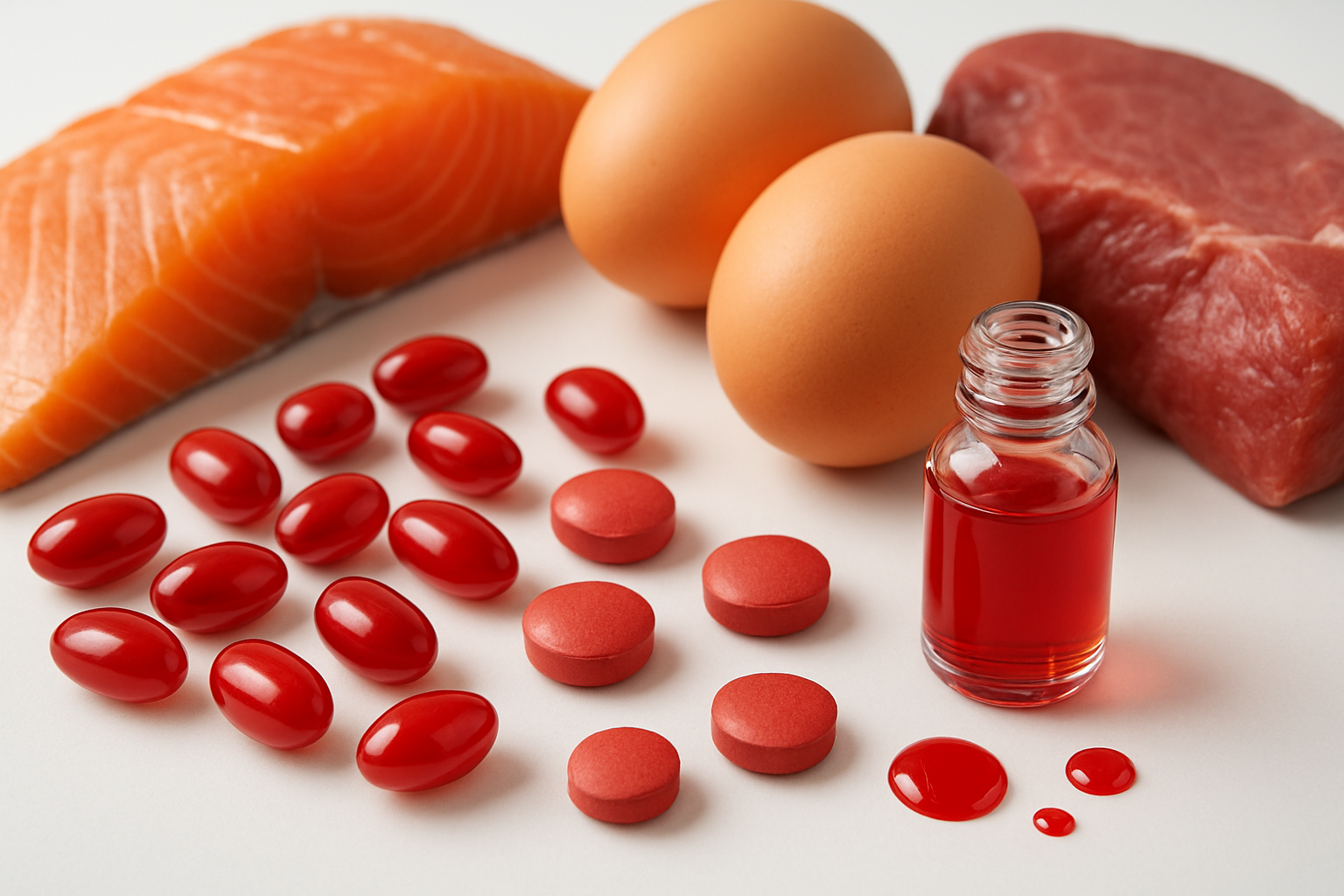
Red Blood Cell Formation and Anemia Prevention
Vitamin B12 plays an absolutely crucial role in producing healthy red blood cells. Your bone marrow relies on this vitamin to create properly sized, fully functional red blood cells that can effectively transport oxygen throughout your body. Without enough B12, your body produces abnormally large, immature red blood cells called megaloblasts that can’t do their job properly.
This deficiency leads to megaloblastic anemia, a condition where your tissues don’t get the oxygen they need. People with B12-deficient anemia often experience:
- Persistent fatigue and weakness
- Shortness of breath during normal activities
- Pale or yellowish skin tone
- Cold hands and feet
- Irregular heartbeat
The connection between B12 and iron absorption also matters here. B12 helps your body better absorb and use iron, creating a synergistic effect that supports optimal red blood cell production. This dual action makes B12 essential for preventing both megaloblastic anemia and supporting overall blood health.
Neurological Function Support and Brain Health Maintenance
Your nervous system depends heavily on vitamin B12 for proper function and long-term health. B12 maintains the myelin sheath, a protective coating around nerve fibers that speeds up electrical signals between your brain and body. When B12 levels drop, this protective layer deteriorates, leading to nerve damage that can become permanent if left untreated.
Brain health benefits of adequate B12 include:
- Enhanced memory formation and retention
- Improved concentration and mental clarity
- Better mood regulation and emotional stability
- Reduced risk of cognitive decline with aging
B12 deficiency can cause serious neurological symptoms like tingling in hands and feet, balance problems, confusion, and memory loss. These symptoms often appear before anemia develops, making B12 status particularly important for older adults who absorb less of this vitamin from food.
The vitamin also supports neurotransmitter production, helping regulate mood and sleep patterns. Low B12 levels have been linked to depression and anxiety, though supplementation can help restore normal neurological function when deficiency is the underlying cause.
DNA Synthesis and Cellular Repair Mechanisms
At the cellular level, vitamin B12 works as a coenzyme in DNA synthesis, making it essential for proper cell division and growth. Every time your cells divide to replace damaged or worn-out tissue, they need B12 to copy genetic material accurately. This process affects every organ system in your body.
B12’s role in cellular repair includes:
- Supporting healthy cell division in rapidly dividing tissues
- Maintaining genetic stability during DNA replication
- Assisting in protein synthesis for tissue repair
- Supporting immune cell production and function
| Cellular Process | B12’s Role | Health Impact |
|---|---|---|
| DNA Replication | Coenzyme for nucleotide synthesis | Prevents genetic errors |
| Cell Division | Supports proper chromosome separation | Healthy tissue growth |
| Protein Synthesis | Aids amino acid metabolism | Tissue repair and maintenance |
| Immune Function | Supports white blood cell production | Better disease resistance |
The vitamin works closely with folate in these processes, and deficiency in either nutrient can disrupt normal cellular function. This partnership is especially important during periods of rapid growth, pregnancy, and recovery from illness or injury when your body’s cellular repair mechanisms are working overtime.
How Vitamin C and B12 Work Together for Maximum Health Impact
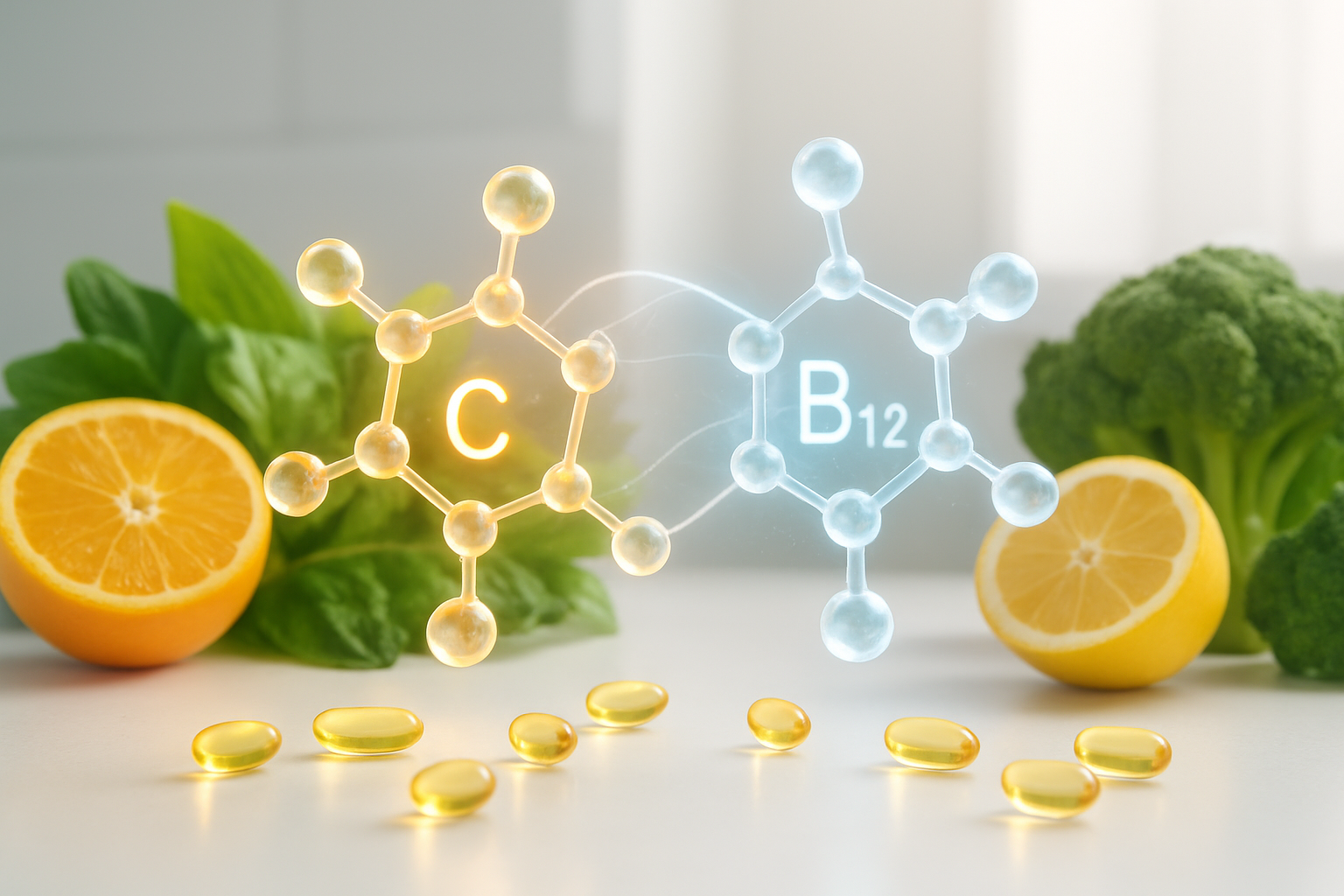
Complementary Roles in Energy Metabolism and Vitality
Vitamin C and B12 create a powerful partnership when it comes to boosting your energy levels naturally. While B12 directly supports the production of red blood cells and helps convert food into usable energy, vitamin C acts as the perfect sidekick by enhancing iron absorption and protecting cells from oxidative stress during energy production.
Your body’s mitochondria—the cellular powerhouses—rely heavily on this dynamic duo. B12 helps maintain the myelin sheaths around nerve cells, ensuring efficient energy signal transmission throughout your body. Meanwhile, vitamin C protects these energy-producing processes from harmful free radicals that naturally occur during cellular metabolism.
The synergy becomes especially noticeable during physical activity or periods of mental stress. B12 supports the nervous system’s ability to coordinate energy demands, while vitamin C helps your adrenal glands produce stress hormones and maintains healthy cortisol levels. Together, they help prevent that afternoon crash and keep your energy steady throughout the day.
Combined Support for Cardiovascular System Optimization
Your heart and blood vessels get exceptional benefits when these vitamins work together. B12 plays a crucial role in managing homocysteine levels—high amounts of this amino acid can damage blood vessel walls and increase cardiovascular disease risk. Vitamin C supports this process by strengthening blood vessel walls through collagen synthesis and providing antioxidant protection.
The partnership extends to blood pressure regulation and circulation improvement. Vitamin C helps your blood vessels dilate properly, improving blood flow, while B12 ensures your red blood cells can carry oxygen efficiently throughout your circulatory system. This combination reduces strain on your heart and promotes better overall cardiovascular function.
Research shows that people with adequate levels of both vitamins tend to have healthier cholesterol profiles and reduced inflammation markers in their cardiovascular system.
Enhanced Nutrient Absorption When Taken Together
Taking vitamin C and B12 together creates a more favorable environment for nutrient absorption in your digestive system. Vitamin C’s acidity helps maintain the stomach’s pH levels, which is essential for B12 absorption—especially important since B12 requires specific stomach acid conditions to separate from food proteins.
This partnership also improves iron absorption, which is crucial for preventing anemia. The iron-vitamin C connection becomes even more powerful when B12 is present, as B12 helps with red blood cell formation that carries the absorbed iron throughout your body.
The timing and method of consumption matter too. Taking these vitamins with meals enhances their bioavailability, and the presence of both vitamins can help reduce digestive upset that sometimes occurs with individual supplementation.
Synergistic Effects on Immune System Performance
Your immune system gets a significant boost when vitamin C and B12 work together. While vitamin C is famous for its immune-supporting properties, B12 plays an equally important role in maintaining healthy white blood cell production and function. Together, they create a more robust immune response than either vitamin could achieve alone.
B12 supports the production of immune cells in your bone marrow, while vitamin C enhances their activity and helps them communicate more effectively. This combination is particularly powerful during cold and flu season or when you’re under stress, as both conditions can deplete these essential nutrients rapidly.
The partnership also supports your body’s natural detoxification processes. Vitamin C helps neutralize toxins and free radicals, while B12 supports liver function and methylation processes that help eliminate harmful substances from your body. This dual action keeps your immune system focused on fighting real threats rather than dealing with accumulated cellular damage.
Identifying Common Deficiency Signs and Health Risks

Vitamin C Deficiency Symptoms and Long-term Consequences
When your body doesn’t get enough vitamin C, the warning signs can sneak up on you gradually. Early symptoms include persistent fatigue, frequent bruising, and slow wound healing. You might notice your gums becoming swollen or bleeding easily when brushing your teeth. Skin problems like rough, bumpy patches or small red spots around hair follicles are also telltale signs.
Joint pain and swelling can develop as collagen production decreases. Your immune system takes a hit too, making you more susceptible to colds and infections that seem to linger longer than usual. Iron deficiency anemia may occur since vitamin C helps your body absorb iron effectively.
The most severe form of vitamin C deficiency is scurvy, which sounds like an old-fashioned disease but still occurs today. Left untreated, severe deficiency can lead to:
- Cardiovascular complications due to weakened blood vessel walls
- Dental problems including tooth loss and gum disease
- Compromised bone health as collagen is essential for bone matrix
- Impaired wound healing that can lead to chronic infections
B12 Deficiency Warning Signs and Neurological Impacts
B12 deficiency often develops slowly, making it tricky to catch early. The symptoms can be subtle at first but become increasingly serious over time. Physical signs include unexplained weakness, pale or yellowish skin, and a smooth, red tongue that may feel sore.
Digestive issues like loss of appetite, constipation, or gas are common early indicators. You might experience heart palpitations or shortness of breath as your body struggles to produce healthy red blood cells.
The neurological symptoms are particularly concerning and can be irreversible if left untreated:
- Cognitive changes including memory problems, confusion, and difficulty concentrating
- Mood disorders such as depression, irritability, or personality changes
- Nerve damage causing numbness, tingling, or burning sensations in hands and feet
- Balance problems and difficulty walking
- Vision disturbances in severe cases
B12 deficiency can cause permanent nerve damage, especially to the spinal cord and peripheral nerves. The longer the deficiency persists, the greater the risk of irreversible neurological complications.
Increased Health Risks When Both Vitamins Are Insufficient
Having deficiencies in both vitamin C and B12 creates a perfect storm for serious health complications. Your body’s interconnected systems suffer when these essential nutrients are missing, amplifying the negative effects of each individual deficiency.
Compromised Immune Function: Both vitamins play crucial roles in immune system support. Without adequate levels, you become vulnerable to frequent infections, slower recovery times, and increased inflammation throughout your body.
Accelerated Aging and Cellular Damage: Vitamin C’s antioxidant properties work alongside B12’s role in DNA synthesis and repair. When both are deficient, cellular damage accelerates, potentially increasing cancer risk and speeding up the aging process.
Severe Anemia Risk: While B12 deficiency causes megaloblastic anemia, vitamin C deficiency impairs iron absorption, leading to iron-deficiency anemia. Together, these create a complex anemic state that’s harder to treat and more debilitating.
| Combined Deficiency Effects | Impact Level |
|---|---|
| Cardiovascular stress | High |
| Neurological deterioration | Severe |
| Immune system collapse | Critical |
| Energy metabolism disruption | Extreme |
Mental Health Deterioration: The combination significantly increases risks for depression, anxiety, and cognitive decline. B12 affects neurotransmitter production while vitamin C influences stress hormone regulation, creating a cascade of mental health challenges when both are insufficient.
Optimal Food Sources and Dietary Strategies
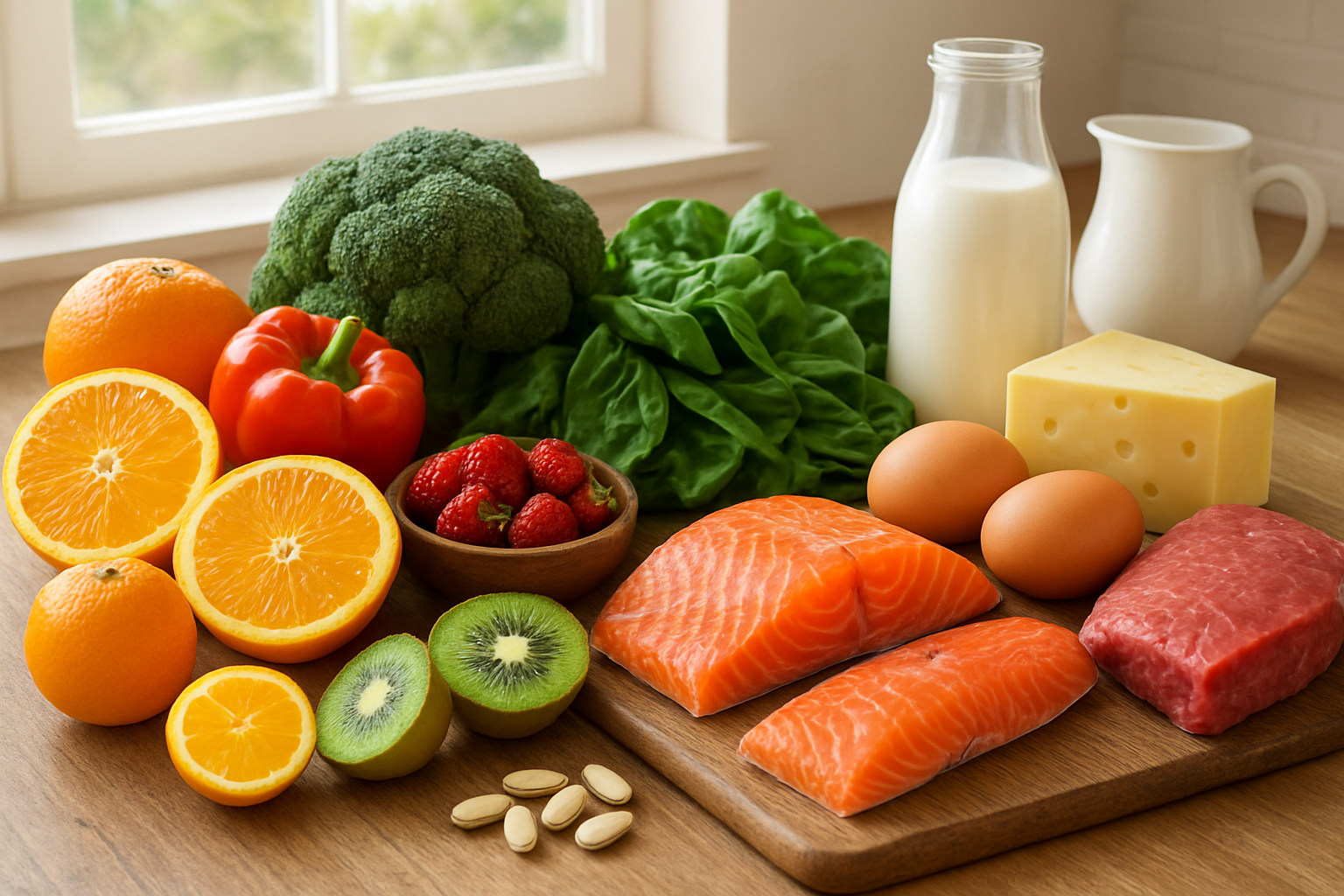
Top Vitamin C Rich Foods for Daily Consumption
Citrus fruits dominate the vitamin C landscape, with oranges providing about 70mg per medium fruit and grapefruits offering roughly 90mg per half. Berries pack an impressive punch too – strawberries deliver 85mg per cup, while blackberries and raspberries contribute 30mg per cup.
Red bell peppers stand out as nutritional powerhouses, containing nearly 190mg of vitamin C per cup – more than double what you’d find in most citrus fruits. Yellow peppers follow closely with 140mg per cup. Kiwi fruits are another excellent choice, providing 85mg per medium fruit along with fiber and potassium.
Leafy greens shouldn’t be overlooked. Raw kale contains 80mg per cup, while cooked Brussels sprouts offer 75mg per half-cup serving. Broccoli provides 50mg per half-cup cooked portion. Tropical fruits like papaya (95mg per cup) and guava (125mg per half-cup) round out the top sources.
| Food Source | Vitamin C Content | Serving Size |
|---|---|---|
| Red Bell Pepper | 190mg | 1 cup chopped |
| Guava | 125mg | 1/2 cup |
| Papaya | 95mg | 1 cup |
| Orange | 70mg | 1 medium |
| Strawberries | 85mg | 1 cup |
Best Natural Sources of Vitamin B12 in Your Diet
Animal products remain the primary natural sources of vitamin B12 since plants don’t produce this essential nutrient. Fish leads the pack with salmon containing 4.8mcg per 3.5-ounce serving, while sardines provide an impressive 8.9mcg per serving. Tuna offers 2.5mcg per serving, making seafood an excellent weekly addition to your meal rotation.
Meat options include beef liver, which contains a whopping 70mcg per 3.5-ounce serving – though this might be too intense for regular consumption. Ground beef provides 2.6mcg per serving, while chicken breast offers 0.3mcg per serving. Eggs contribute 0.6mcg per large egg, primarily concentrated in the yolk.
Dairy products offer reliable B12 sources: milk contains 1.2mcg per cup, plain yogurt provides 1.1mcg per cup, and Swiss cheese delivers 1.5mcg per ounce. Fortified nutritional yeast has become popular among health enthusiasts, providing 2.4mcg per tablespoon when fortified.
Shellfish deserve special mention – clams contain an extraordinary 84mcg per 3-ounce serving, while mussels provide 20mcg per serving. These seafood options can help you meet weekly B12 needs with just one or two servings.
Meal Planning Strategies to Maximize Both Nutrients
Creating meals that optimize both vitamins requires thoughtful combinations and cooking techniques. Start your day with a breakfast that includes both nutrients: scrambled eggs (B12) with sliced strawberries (vitamin C) and a glass of fortified orange juice.
Lunch combinations work well with salmon salads topped with bell peppers and citrus-based dressings. The healthy fats in salmon help with nutrient absorption while the raw vegetables preserve their vitamin C content. Another effective lunch option pairs lean beef with a side of steamed broccoli and fresh fruit.
Dinner strategies can include grilled fish with roasted Brussels sprouts and a side of fresh berries for dessert. Alternatively, prepare stir-fries using minimal cooking time to preserve vitamin C while including B12-rich ingredients like eggs or small amounts of meat.
Weekly meal prep helps ensure consistent intake. Prepare containers with pre-cut vitamin C-rich vegetables that can be quickly added to B12-containing main dishes. Keep frozen berries on hand for smoothies that can include a tablespoon of fortified nutritional yeast.
Timing matters too – consume vitamin C-rich foods when fresh and raw when possible, while B12 absorption improves when consumed with other B vitamins found in whole grains and leafy greens.
Special Considerations for Vegetarians and Vegans
Plant-based eaters face unique challenges since natural B12 sources are almost exclusively animal-derived. Fortified foods become essential – look for fortified plant milks (soy, almond, oat) that provide 1-3mcg per cup. Fortified breakfast cereals can contribute 1.5-6mcg per serving, depending on the brand.
Nutritional yeast, when fortified, becomes a versatile ingredient providing B12 while adding a nutty, cheese-like flavor to dishes. Two tablespoons typically provide the full daily requirement. Some brands of plant-based meat alternatives are fortified with B12, offering 1-2mcg per serving.
Vitamin C poses fewer challenges for plant-based diets since the best sources are already plant foods. Focus on eating a variety of colorful fruits and vegetables throughout the day. Raw preparations maximize vitamin C content, so include fresh fruits, raw vegetables in salads, and lightly steamed rather than heavily cooked vegetables.
Vegetarians have easier access to B12 through eggs and dairy products. Two eggs plus a cup of milk can provide most of the daily B12 requirement. Lacto-vegetarians can rely on dairy products like yogurt, milk, and cheese for consistent B12 intake.
Both groups should consider B12 supplementation or regular monitoring of B12 levels, especially vegans, since deficiency can develop gradually over years. Combining fortified foods with supplements provides the most reliable approach for maintaining adequate B12 status.
Supplementation Guidelines for Enhanced Wellness

Determining Your Individual Dosage Requirements
Your body’s need for vitamin C and B12 depends on several personal factors that go beyond the standard recommended daily allowances. Age plays a major role – older adults often need higher doses of B12 since stomach acid production decreases with time, making absorption more challenging. Pregnant and breastfeeding women require increased amounts of both vitamins to support fetal development and milk production.
Lifestyle factors significantly impact your requirements. Smokers need at least 35mg more vitamin C daily than non-smokers because smoking depletes this antioxidant rapidly. Heavy drinkers, vegetarians, and vegans typically need B12 supplementation since alcohol interferes with absorption and plant foods contain little to no bioavailable B12.
Certain medications also increase your needs. Proton pump inhibitors, metformin, and antibiotics can reduce B12 absorption, while aspirin and oral contraceptives may lower vitamin C levels. People with digestive issues like Crohn’s disease or celiac disease often struggle with nutrient absorption and may benefit from higher doses.
Blood tests provide the most accurate picture of your current status. Serum B12 levels below 300 pg/mL often indicate functional deficiency, even if they fall within the “normal” range. For vitamin C, plasma levels help determine if you’re getting enough for optimal immune function and collagen synthesis.
Choosing High-Quality Supplement Forms and Combinations
Not all vitamin supplements are created equal, and the form you choose can dramatically affect how well your body uses these nutrients. For vitamin C, several options exist with different absorption profiles and benefits.
Vitamin C Forms:
- Ascorbic acid: Most common and cost-effective, but can cause stomach upset in sensitive individuals
- Sodium ascorbate: Gentler on the stomach, ideal for people with acid sensitivity
- Liposomal vitamin C: Wrapped in fat molecules for better absorption and longer retention
- Time-release formulas: Provide steady levels throughout the day since vitamin C is water-soluble
Vitamin B12 Forms:
- Cyanocobalamin: Synthetic but stable, requires conversion by the liver
- Methylcobalamin: Active form that crosses the blood-brain barrier easily
- Hydroxocobalamin: Long-lasting form often used in injections
- Adenosylcobalamin: Active in cellular energy production
Quality matters immensely. Look for third-party tested products with certificates of analysis. USP, NSF, or ConsumerLab certifications indicate the product contains what’s listed on the label without harmful contaminants.
Combination supplements can offer convenience, but check that the doses match your individual needs. Some B-complex vitamins pair well with vitamin C, though high doses of one B vitamin can sometimes interfere with others’ absorption.
Timing Strategies for Optimal Absorption and Effectiveness
When you take your supplements can be just as important as what you take. Vitamin C absorbs best on an empty stomach, but this can cause nausea in some people. If you experience stomach discomfort, take it with a small amount of food containing healthy fats.
Since vitamin C is water-soluble and your body doesn’t store it well, splitting larger doses throughout the day works better than taking everything at once. Your body can only absorb about 200-400mg at a time, so doses above this amount often result in expensive urine rather than health benefits.
B12 absorption follows different rules. Sublingual (under the tongue) forms bypass the digestive system entirely, making them ideal for people with absorption issues. If you’re taking oral B12, take it on an empty stomach for best results. The intrinsic factor needed for B12 absorption works best when stomach acid levels are adequate.
Avoid taking calcium supplements at the same time as either vitamin, as calcium can interfere with absorption. Coffee and tea can also reduce absorption when consumed simultaneously with supplements.
For people taking multiple supplements, space them out. Take vitamin C in the morning and afternoon, and B12 either first thing in the morning or at bedtime. This prevents competition for absorption pathways and helps maintain steady levels throughout the day.
Consider your sleep schedule too – some people find B12 energizing and prefer morning doses, while others take it at night without sleep issues.
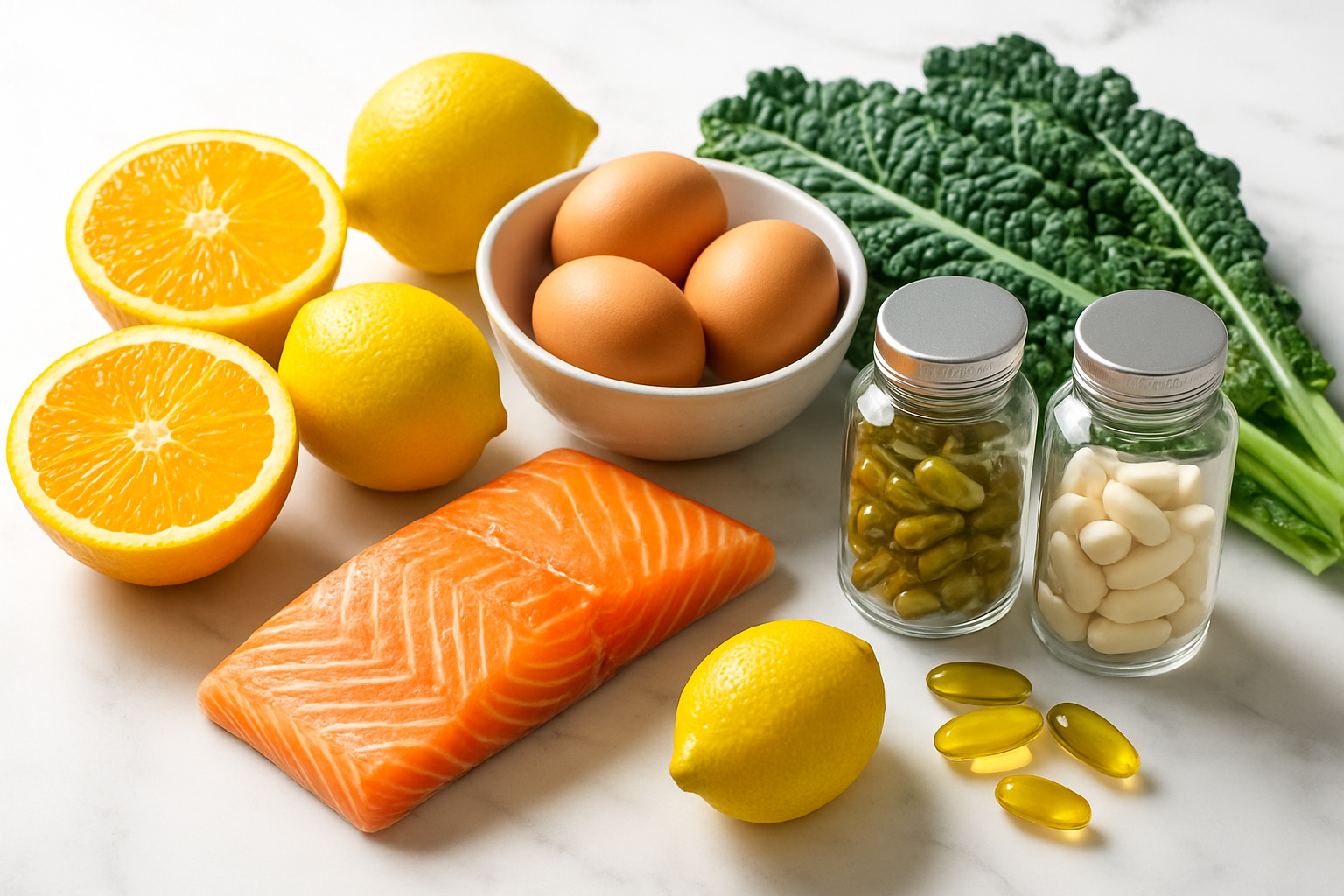
Vitamin C and B12 aren’t just nutrients your body needs – they’re a powerful duo that work better together than apart. When you get enough of both vitamins, you’re supporting your immune system, energy levels, and overall health in ways that go beyond what each vitamin can do alone. The key signs of deficiency are pretty clear once you know what to look for, from constant fatigue to slow-healing wounds, and catching these early can make a huge difference in how you feel day-to-day.
Getting these vitamins doesn’t have to be complicated. Focus on eating a variety of colorful fruits and vegetables for vitamin C, and include animal products or fortified foods for B12. If you’re plant-based or have absorption issues, smart supplementation can fill the gaps. The bottom line is simple: pay attention to what your body needs, eat a balanced diet, and don’t ignore the warning signs your body gives you when something’s missing.

